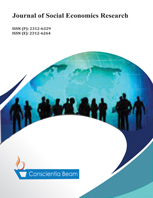Effects of Socio-Cultural Diversity on the Performance of Private Health Care Organizations in Kogi State
DOI:
https://doi.org/10.18488/journal.35.2019.62.126.138Abstract
This study focused on the effect of socio-cultural diversity on the performance of Private Health Care Organizations in Kogi State. The study thus examined the effect of age difference, gender, ethnicity, religion, physical abilities and cultural beliefs on the patients’ satisfaction, financial performance and technological innovativeness of Private Health Care Organizations in Kogi State. The study used a descriptive research design. The population (1460) of the study comprised of the staff of Private Health Care Organizations in Kogi State. The sample size of 304 was determined using Sallant and Dillman’s sample size method. A two-method sampling technique was used. The data gathered were analyzed using descriptive statistics and Multiple Regression analysis. Finding shows that age difference, physical ability and religious differences have significantly positive effect on patients’ satisfaction; as against ethnic difference which has inverse effect. Ethnicity, cultural and gender differences have positive effects on the financial performance; as against age and religious differences which have significantly negative relationship. The study concludes that diversity in terms of age, physical ability and religion are taken seriously and managed very well in the Health Care Organizations of Kogi State. This study therefore recommends that the management, government and other stakeholders should invest in diversity management training and development programmes to widen the opportunity to create patients’ satisfaction and achieve other goals in the Health Care Organizations in Kogi State.

